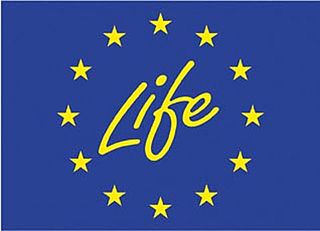Related Research Articles

The European Investment Bank (EIB) is the European Union's investment bank and is owned by the 27 member states. It is the largest multilateral financial institution in the world. The EIB finances and invests both through equity and debt solutions companies and projects that achieve the policy aims of the European Union through loans, equity and guarantees.

Research and development, known in some countries as experiment and design, is the set of innovative activities undertaken by corporations or governments in developing new services or products. R&D constitutes the first stage of development of a potential new service or the production process.
Small and medium-sized enterprises (SMEs) or small and medium-sized businesses (SMBs) are businesses whose personnel and revenue numbers fall below certain limits. The abbreviation "SME" is used by many national agencies and international organizations such as the World Bank, the OECD, European Union, the United Nations, and the World Trade Organization (WTO).
A business incubator is an organization that helps startup companies and individual entrepreneurs to develop their businesses by providing a fullscale range of services, starting with management training and office space, and ending with venture capital financing. The National Business Incubation Association (NBIA) defines business incubators as a catalyst tool for either regional or national economic development. NBIA categorizes its members' incubators by the following five incubator types: academic institutions; non-profit development corporations; for-profit property development ventures; venture capital firms, and a combination of the above.

The Regional Policy of the European Union (EU), also referred as Cohesion Policy, is a policy with the stated aim of improving the economic well-being of regions in the European Union and also to avoid regional disparities. More than one third of the EU's budget is devoted to this policy, which aims to remove economic, social and territorial disparities across the EU, restructure declining industrial areas and diversify rural areas which have declining agriculture. In doing so, EU regional policy is geared towards making regions more competitive, fostering economic growth and creating new jobs. The policy also has a role to play in wider challenges for the future, including climate change, energy supply and globalisation.

The European Structural and Investment Funds are financial tools governed by a common rulebook, set up to implement the regional policy of the European Union, as well as the structural policy pillars of the Common Agricultural Policy and the Common Fisheries Policy. They aim to reduce regional disparities in income, wealth and opportunities. Europe's poorer regions receive most of the support, but all European regions are eligible for funding under the policy's various funds and programmes. The current framework is set for a period of seven years, from 2021 to 2027.
In the European Union education is at the responsibility of its Member States and their Ministries of education that they have; in such, the European Union institutions play only a supporting and overseeing role. According to Art. 165 of the Treaty on the Functioning of the European Union, the Community
shall contribute to the development of quality education by encouraging cooperation between Member States, through actions such as promoting the mobility of citizens, designing joint study programmes, establishing networks, exchanging information or teaching languages of the European Union. The Treaty also contains a commitment to promote life-long learning for all citizens of the Union.
The European Institute of Innovation and Technology (EIT) is an independent body of the European Union with juridical personality, established in 2008 intended to strengthen Europe's ability to innovate. The EIT’s three “core pillars” of activities are: entrepreneurial education programmes and courses across Europe that transform students into entrepreneurs; business creation and acceleration services that scale ideas and budding businesses; and innovation-driven research projects that turn ideas into products by connecting partners, investors, and expertise.

The Regulatory Flexibility Act (RFA) is perhaps the most comprehensive effort by the US federal government to balance the social goals of federal regulations with the needs and capabilities of small businesses and other small entities in American society. In practice, the RFA attempts to "scale" the actions of the federal government to the size of the groups and organizations affected.
Interreg is a series of programmes to stimulate cooperation between regions in and out of the European Union (EU), funded by the European Regional Development Fund. The first Interreg started in 1989. Interreg IV covered the period 2007–2013. Interreg V (2014–2020) covers all 27 EU member states, the EFTA countries, six accession countries and 18 neighbouring countries. It has a budget of EUR 10.1 billion, which represents 2.8% of the total of the European Cohesion Policy budget. Since the non EU countries don't pay EU membership fee, they contribute directly to Interreg, not through ERDF.
EQUAL was a Community Initiative within the European Social Fund of the European Union. It concerned “transnational co-operation to promote new means of combating all forms of discrimination and inequalities in connection with the labour market”. It ran from 2001 till 2007 with a budget of some €3 billion of EU resources, matched by a similar sum from national resources.
The Competitiveness and Innovation Framework Programme (CIP) of the European Commission is meant to improve the competitiveness of European companies facing the challenges of globalization. The programme is mainly aimed at small and medium-sized enterprises (SMEs), which will receive support for innovation activities, better access to finance and business support services. It will run from 2007 to 2013.

The Enterprise Europe Network is a cross-border business network that provides support for small and medium enterprises (SMEs) to innovate and grow internationally. It is co-funded by the European Union's COSME and Horizon 2020 programmes.

The LIFE programme is the European Union's funding instrument for the environment and climate action. The general objective of LIFE is to contribute to the implementation, updating and development of EU environmental and climate policy and legislation by co-financing projects with European added value. LIFE began in 1992 and to date there have been five phases of the programme. During this period, LIFE has co-financed some 4600 projects across the EU, with a total contribution of approximately 6.5 billion Euros to the protection of the environment and of climate. For the next phase of the programme (2021–2027) the European Commission proposed to raise the budget to 5.45 billion Euro.
The Institute for Small and Medium Industry of the Generalitat Valenciana (IMPIVA) is a public body of the Generalitat Valenciana established by the law of the Generalitat Valenciana 2 / 84 and attached to the Ministry of Economy, Industry and Commerce.

South Moravian Innovation Centre is a Czech association of legal entities in Brno, Czech Republic that supports companies and connects them with universities and research institutions.

The Juncker Commission was the European Commission in office from 1 November 2014 to 30 November 2019. Its president was Jean-Claude Juncker, who presided over 27 other commissioners. In July 2014, Juncker was officially elected to succeed José Manuel Barroso, who completed his second five-year term in that year.
The European Research Executive Agency is a funding body mandated by the European Commission to support the EU Research and Innovation policy. It has been established by the European Commission, based on Council Regulation (EC) No 58/2003.

The Capital Markets Union (CMU) is an economic policy initiative launched by the former president of the European Commission, Jean-Claude Juncker in the initial exposition of his policy agenda on 15 July 2014. The main target was to create a single market for capital in the whole territory of the EU by the end of 2019. The reasoning behind the idea was to address the issue that corporate finance relies on debt (i.e. bank loans) and the fact that capital markets in Europe were not sufficiently integrated so as to protect the EU and especially the Eurozone from future crisis. The Five Presidents Report of June 2015 proposed the CMU in order to complement the Banking union of the European Union and eventually finish the Economic and Monetary Union (EMU) project. The CMU is supposed to attract 2000 billion dollars more on the European capital markets, on the long-term.
References
- 1 2 3 Special Report No 07 // 2014#Has the ERDF successfully supported the development of business incubators? #(pursuant to Article 287(4), second subparagraph, TFEU), 2014, retrieved 2024-12-16
- ↑ "Qué es ANCES". ANCES Asociación Nacional de CEEIs (in European Spanish). Retrieved 2024-12-16.
- 1 2 COMMISSION REPORT ON COORDINATION OF THE ACTIVITIES IN FAVOUR OF SMALL AND MEDIUM-SIZED ENTERPRISES (SMEs), 1994, retrieved 2024-12-16
- ↑ "Centre européen d'entreprise et d'innovation". infonet.fr (in French). Retrieved 2024-12-16.
- 1 2 3 AMENDED PROPOSAL FOR A COUNCIL DECISION CONCERNING A COMMUNITY MEASURE FOR THE CREATION AND DEVELOPMENT OF BUSINESS AND INNOVATION CENTRES AND THEIR NETWORK, 1988, retrieved 2024-12-16
- 1 2 "EUR-Lex - C:1994:013:TOC - EN - EUR-Lex". eur-lex.europa.eu. Retrieved 2024-12-16.
- 1 2 "The leverage effect of structural funds on the evolution of the EU|BICs in Europe - Publications Office of the EU". Publications Office of the EU. 2014-11-03. Retrieved 2024-12-16.